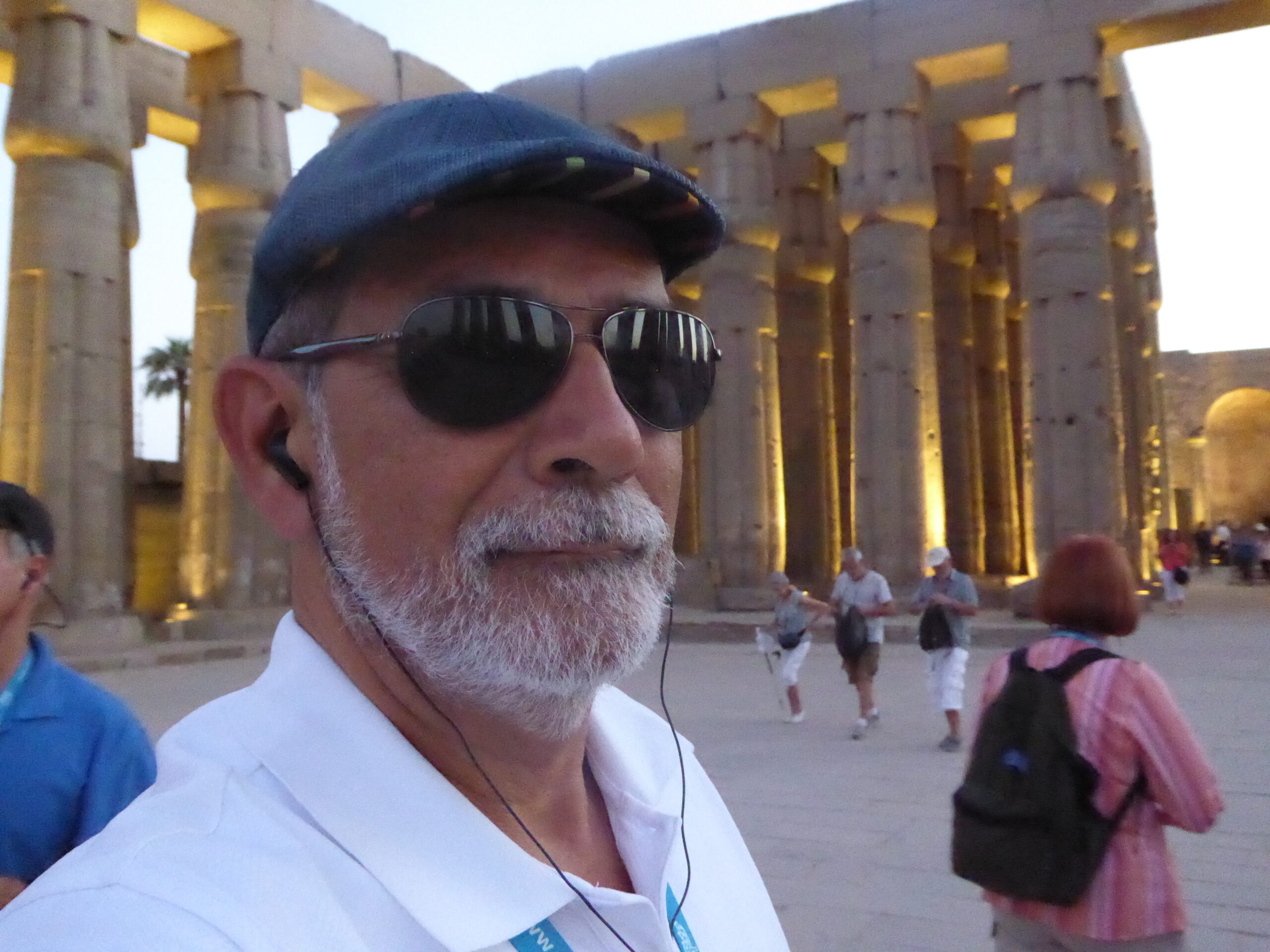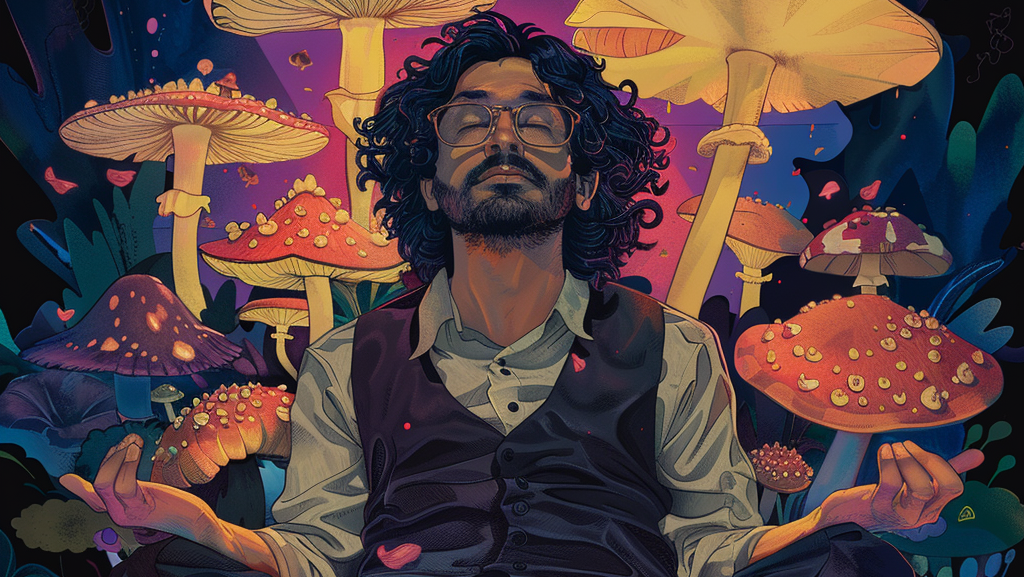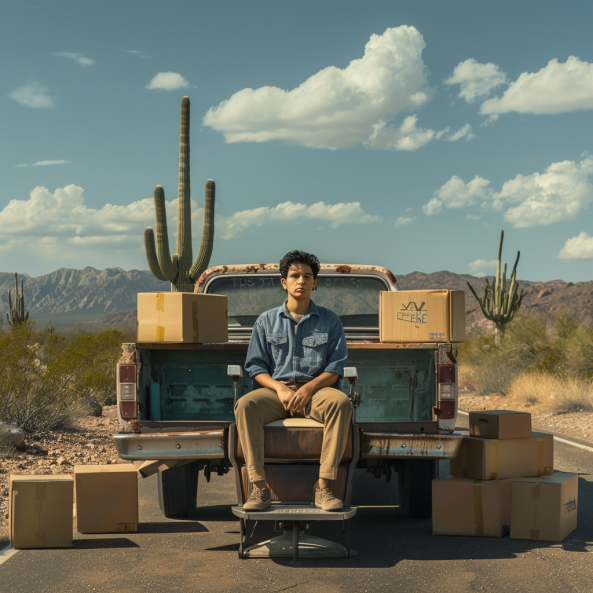
Dad’s second oldest brother, my Tio Ysidro, lived with his family in Cucapah, a small ejido (communal farm) with about one hundred people that was about two hours south of Mexicali. Tio Ysidro was a humble man (my mother said he was just lazy) who raised corn, chickens, and a few pigs in the summer to feed his family. Tio had four sons and two daughters and they took care of the corn field while he made the rounds of the ejido to chat with the other half dozen households. He was also a local entrepreneur and made a few centavos the rest of the year selling raspadas and gathering firewood in the foothills that he sold or traded to his vecinos, his communal neighbors.
I had just turned fourteen and Dad said it was time for just the two of us to make our way to visit Tio Isidro and the family. Mom was happy not to go as were my younger sister and brother as life was a bit primitive in Cucapah with no running water or electricity and a tiny outhouse to handle body functions. I was up for the trip as Dad said I might be able to drive the pickup once we were across the border.
Before we left right after school let out for the summer, I spent a few weeks visiting the family, all on my mother’s side, to gather up used clothing and other items to take. My tias (aunts) were glad to get rid of old stuff, especially children’s clothes that no longer fit and chipped plates and beat up pans. My tios (uncles) donated used work boots and jackets and pants with holes and stains but the pants had been washed and the boots still had some sole left. I collected a lot of stuff as the truck bed was big. Father on the other hand scored some cool things, including an ancient barber chair that could still be raised using a foot pedal. The barber chair had stood in Feliz’s yard (his close compa) and I had sat on it since I had hair to cut and Feliz had always given me the same cut, close to the scalp and no nicks. I was a bit sad at first that the chair was going away but I thought it would be put to good use and perhaps inspire a new skill for Tio Ysidro. The chair was the crown jewel and we put it in the center of the bed and surrounded it with offerings, most of the stuff wrapped in burlap sacks in case the weather got bad on the ride.
It was the best truck trip of my life and still is, core to the DNA of my boyhood memories. It was going to be a father-son trip, the first and only one until I took my father back to his ancestral hometown of Juchipilla (Zacatecas) right before he died forty years back. I had asked him what he had left to do and he said a trip together to Juchipilla would do the trick. He wanted to smell the air in the mountain town and find some wife prospects for me, recently divorced. Back to our rode trip from Richmond (California) to Cucapah (Baja California).
The Road Trip
My mother was freaked out by the idea of her alcoholic husband and first bookworm boy going south to a place she hated. My father had taken the whole family down to Cucapah a few times before this trip and she was not a happy camper. On those trips she always took everything she could, including cartons of canned foods and milk, the condensed type that the Mexicans loved. On those early trips me and my sister would run around the irrigation canals with my cousins, no shoes on and skipping around lots of cow and burro shit along the sides of the canal where the animals came to drink. Our Mexican cousins, and there was a bunch of them with enough to match our numbers, did not speak English and we used baby pocho Spanish to communicate. On the last family trip three of my Cucapah boy cousins who were about my age convinced me to hike to the mother irrigation canal that fed other irrigation channels and watered all of the ejido fields. I left behind my sister with Mom and Tia Maria and her flock of girls and the four of us ran through a bunch of corn fields until we arrived at the mother canal. I later learned that almost all of the ejidos in the area raised through crops using the last water carried by the Colorado River before it emptied to the Gulf. My cousins dared me to strip down and jump into the canal. The water is moving pretty good about three feet below the tope of the canal. I took their dare and, buck naked, we dove it and tried to drown each other. Good boy fun. We returned to Tio’s adobe abode after the plunge. Mom looked at my filthy clothes and muddy feet and told me to go out to the well and wash up. When Dad came back for dinner after spending the day drinking and playing dominos Mom went off on him. She caught him outside the door and I heard her say that was never retuning to Cucapah unless it was for his funeral. That’s why Dad and I were going alone and he said he had things to tell me.
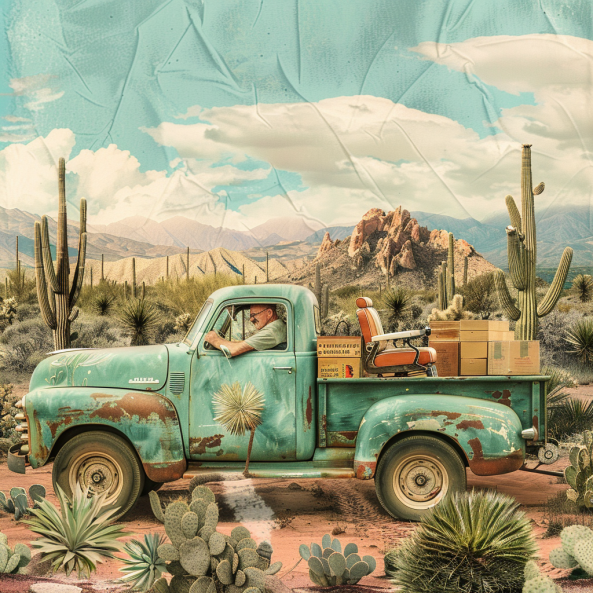
Even as a kid I was crazy about maps and before we left I went to the library to figure out the route and spot for things to see. I knew Dad wanted to get there quickly and knew he would not want to stop along the way for sightseeing but I wanted to be ready. It was a ritual send-off as Mom, my sister and my brother stood at the driveway as we backed out and honked the horn, it still worked and was loud. She looked sad when I turned around to wave at her and then she smiled. I felt good about the trip.
It was a warm summer day and we headed east towards San Jose and then Modesto to catch Highway 99. Dad looked good as he had his hair cut before we left on the chair that was now reigning as queen behind us, surrounded by all her stuff. The first few hours were tough as the truck made a lot of sounds as things shifted around. We mush have stopped a dozen times to tighten the ropes before things settled down. I remember we got to Modesto mid-afternoon and Dad said we would have some of the best birria (goat stew) outside Mexico at a cantina. We stopped and ate and it was good although I got worried that Dad was drinking too much beer. It was a very long stop and we were heading for Visalia to spend the night at some casa de husepedes (a Mexican rooming house) that he said was cheap and safe. We left the cantina and I could see that Dad was not up to speed and it worried me. We had barely got on the road when we were stopped by a motorcycle cop, a brown one. He was an OK cop and asked Dad if he was drunk. Dad started to argue but I spoke over him and told the cop that I had my driver’s permit. Dad figured out what was going on and let me talk. Dad told the cop I was an honors student and we were going to Mexico to give the stuff in the back to his family. The cop was sympathetic and I convinced him that I could get us to where we needed to be for the night. We made it to the casa de huespedes and went to sleep, Dad snoring like a locomotive going uphill.
The Road to Baja
We woke up and Dad rewarded my driving with breakfast at Little Black Sambos, a famous pancake place open 24 hours a day. I had the best pancakes ever with lots of syrup, bacon and sausage, it was heaven. We got back on the road and took turns driving until we got to the LA basin. We came down the grapevine into a pool of smog and made our way past the silhouette he told me was Los Angeles. He headed south to San Diego and then into Tijuana as the gas was cheaper and there was a Mexican road that would take us across the throat of Baja to Mexicali. We spent the night at another case de huespedes and then drove along the La Rumorosa Highway to Mexicali. Loaded with stuff we drove for what seemed like centuries along a two lane road carved out by men with picks and shovels. I’ve read scores of men dies building La Rumorosa and many others have since died falling down its crevices and landing at the bottom of canyons where the caracaras circling as the coyotes wait next to burned out cars and cholla patches. That’s another bite to share later as I’ve traveled the Rumorosa many times since with different outcomes each time I wake.
We decided not to stop for the night but made a short pit stop in Mexicali to plug a radiator leak, buy some cans of oil, and get some spare parts for the truck as Cucapah had no gas station or an auto repair shop. The sun was about to set when we drove south to El Faro where we got on a dirt road to Cucapah. Cool to say that today my cousin Mauro, Tio Ysidro’s oldest, now owns a local cantina hang-out on the El Faro junction to Cucapah. A solid family success story for a future bite.
The Arrival
We drove down the dirt road for a half hour until we reached Cucapah. It was surrounded by corn, squash, and melon fields and the people in the fields stopped their work as we drove by to look at us in our pickup truck. A few of them stopped work and followed us as we entered the ejido and made our way to Tio Ysidro’s adobe hut.
Tio Ysidro’s home was pretty basic. It had a single door facing east, no electricity or plumbing, a clay oven on the western side, a plank table in the center with three rickety chairs, and straw filed mats piled up for sleeping at the other side. He had a well with a bucket and crank situated about fifty feet from the front of the house and the outhouse was a few feet away from the back of the house. He also had a lean-to on the eastern side of the house that could hold several hammocks. He was equipped. We arrived just as the sun was setting and Tio heard the pickup, came outside, embraced father, then me, and we went inside. Dad and I took turns embracing Tia Maria who insisted we sit down at the table and eat her fresh tortillas filled with carnitas and cilantro. It was heaven and we were safely home with the goods, now their goods.
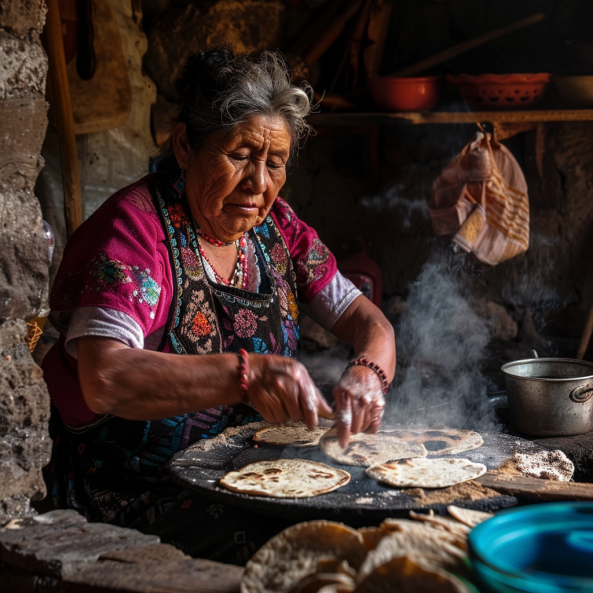
Tio Ysidro was not a drinking man but he brought out a bottle of no-name tequila and two glasses. He was a distinguished looking man standing a bit over six feet, lean, long jet white hair, and a very cool looking mustache that looked razor cut. He called me Mijo Danny and asked if I could show my cousins the pickup truck while the two of them caught up with questions of family and friends. I had four male cousins, three of whom I knew well from past visits and a new primo who was seven or eight. They followed me to the pickup and the four of us crowed into the front seat while the youngest boy looked at us as if we had just come from Mars. It was getting dark but they all wanted to go for a ride so we left the house. They shouted and motioned for me to pass their friends homes and I honked in front for a minute or two as their neighbors came out, many with babies and food in their hands as it was dinner time. They wanted to visit all their friends but it was dark and there were no street or house lights so we went back to their home where we laughed and talked for a long time before they forced me into one of the hammocks to sleep. I had just started back home going out with friends to watch the older teens cruise the main and here I was with my cousins doing the Mexican version.
We got back home, talked, and I ate some beans and tamales. I was running on empty so the boys took me outside to the lean-to and I crawled into a hammock, took off my shoes, and conked out. I woke up at dawn as the roosters were bringing in the day and went into the casa where Tia Maria was making tortillas, cooking beans, and frying eggs. She had two of my girl cousins working with her and they were busy getting us all ready for the day. Tio Ysidro had gone somewhere for wood and my father was still asleep outside on a hammock. I was ready to eat as many fresh tortillas and fried eggs as my fifteen-year-old body could handle, and it was a lot. My boy cousins came in and we filled ourselves while laughing about how jealous their friends had been to see us cruising the ejido in the pickup that had not yet been unloaded.
Dad woke up and said he felt a bit crudo and was hungry. Tio Ysidro came back and told my father he shouldn’t drink so much and asked how long we were staying and what was the plan with the pickup. Dad looked up from his nescafe and told Tio that all the goods on the truck were theirs, and the truck as well. Tio was speechless, looked up and crossed himself and said “Gracias, hermano, eres un buen hombre.” He had said “Thanks brother, you’re a good man.” I could tell that Dad was touched despite his hangover and he gave a deep embrazo to his older brother and looked at me as I nodded my head. It made me proud to see his brother embrace him that morning in Juchipilla, another world that I can still smell and swim in, a world closer now as I record these life bites of another time and place.
I had loaded a big box of Cherrios on the trip and thought it would be cool to educate them about American food. I convinced everyone but my father and Tio to try a small bowl with some condensed milk I had also brought. I took a spoonful of Cherrios and motioned for them to do the same. Each one took a small mouthful and two of the boys quickly spit it all out. The others just looked at me until I started laughing and they spit out their Cherrios as well .We went back to a breakfast of beans, tortillas, and fried eggs. Then we unloaded everything off the truck starting with the stuff stacked up next to the old barber chair.
We set up a human chain line and unloaded the truck starting with the all the clothing, pots, pans, shoes and house stuff. We took all that into the house for inspection by Tia Maria and the girls. Then we gathered the shovels, hoes, rakes, and other tools and outdoor stuff along with the truck parts and cans oil and put them all in a cleaned-out chicken shed. It was fun work as my three cousins and I joked the whole time about stupid things we had done since we had last seen each other. Only the barber chair was left and I climbed up on the deck with my three cousins. We took off the tarp and they stood there speechless until Mauro (my primo age same) climbed up on the chair, cranked himself up, and declared himself El Jefe. He spread out his arms and pretended to bless us. It was probably the high point of his life but it ended quickly as we pulled him off the chair and we carried it off the truck and set it down next to the lean-to. The chair look fit for a king as we had mended the seat and polished the metal parts.
Meanwhile, Dad and Tio Ysidro were talking and smoking cigarettes in the front of the pickup. It only took us about an hour to unload the pickup. We had become an ejido event as we could see small groups of their vecinos (neighbors) looking and pointing at us. The tongues were busy that day and my Cucapah cousins were the new ejido celebrities, maybe even the first if you didn’t count the grumpy El Faro guy on the paved road.
It was a memorable trip and a year later when I hitchhiked from Richmond to Cucapah and beyond I saw that chair still shining under the protection of a new lean-to. We left the pickup behind and my Cucapah cousins used it to haul firewood from the hills, transport chickens, pigs, and even a few burros. My cousin Mauro said that the pickup and the chair changed their lives forever and that my father was a saint, so they thought.
